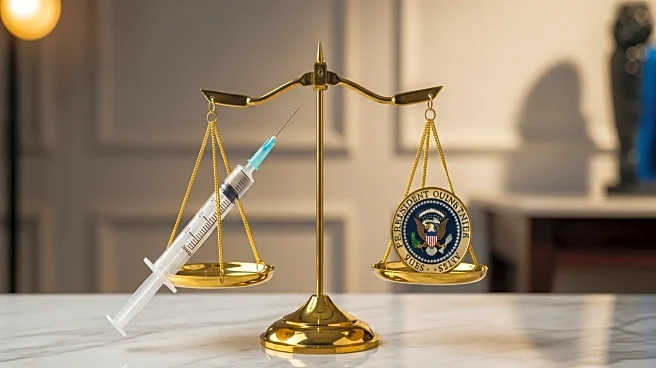What's Happening?
President Trump has publicly acknowledged the internal conflict within his administration regarding COVID-19 vaccine policies. This follows the firing of Susan Monarez, the CDC director, and the subsequent resignation of four senior CDC officials. The resignations were reportedly in protest against Health Secretary Robert F. Kennedy Jr.'s influence on vaccine policies, which they claim are not based on scientific evidence. Trump has expressed skepticism about the vaccine program, demanding that pharmaceutical companies provide more evidence to justify the continued use of COVID vaccines. This marks a significant shift from his previous support of 'Operation Warp Speed,' which facilitated the rapid development and distribution of vaccines during the pandemic.
Why It's Important?
The turmoil within the Trump administration over vaccine policies could have significant implications for public health and vaccine distribution in the U.S. The skepticism expressed by President Trump and the influence of vaccine-skeptic Robert F. Kennedy Jr. may lead to changes in vaccine policy, potentially affecting millions of Americans. This internal conflict highlights the ongoing debate within the Republican party and the broader public about the efficacy and safety of COVID vaccines. The resignations of key CDC officials underscore concerns about political interference in public health decisions, which could undermine trust in health institutions and vaccine programs.
What's Next?
The next steps may involve further scrutiny of vaccine policies and potential changes in the administration's approach to COVID vaccines. President Trump's demand for more evidence from pharmaceutical companies could lead to increased pressure on these companies to publicly release data supporting vaccine efficacy. The administration may face challenges in maintaining public trust and ensuring effective vaccine distribution amid these internal conflicts. Stakeholders, including public health officials, pharmaceutical companies, and political leaders, will likely continue to debate the best path forward for vaccine policy.
Beyond the Headlines
The situation raises ethical and legal questions about the role of political influence in public health decisions. The resignations of CDC officials highlight the potential consequences of prioritizing political agendas over scientific evidence in health policy. This development may also reflect broader cultural shifts within the U.S., where skepticism towards vaccines and scientific expertise is becoming more prevalent, particularly within certain political circles.










